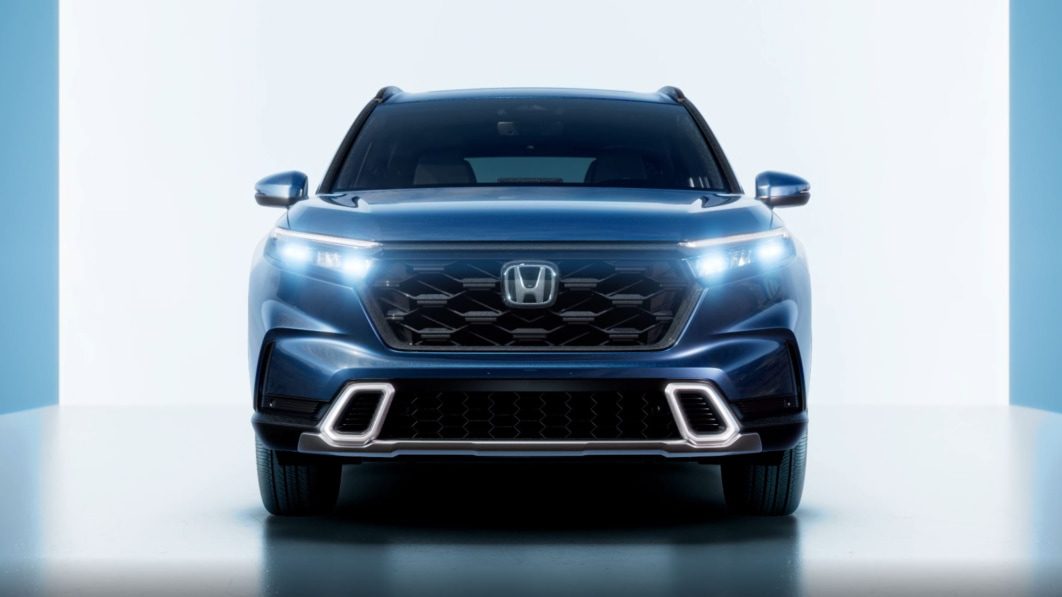2023 Honda CR-V gets bigger, meaner and greener

It may seem just yesterday that Honda overhauled its bread-and-butter compact crossover, but in reality, the last time we saw a completely redesigned CR-V, Obama was the lamest of ducks and Hillary Clinton appeared poised to take the White House. Thankfully, the world has calmed down considerably over the past six years, to the point where the introduction of the 2023 Honda CR-V seems wildly exciting by comparison.
Seriously, if 2016 doesn’t feel like a lifetime ago, we’d like a taste of whatever you’re imbibing. One thing hasn’t changed, however: The CR-V is one of the most successful compact crossover-style SUVs on the market, lagging only the Toyota RAV4 in sheer sales. It should come as no surprise then that Honda did more than throw a fresh coat of paint on its compact crossover before sending it out the door.
The 2023 CR-V’s new styling borrows a bit from the redesigned Civic, but that resemblance pretty much begins and ends at the nose. Elsewhere, there are more nods to Passport, Ridgeline and Pilot than to anything else on Honda’s lineup — yeah, go figure; the crossovers/SUVs look similar. If you ask us, Honda drew some inspiration from the likes of the Mazda CX-5 and Volkswagen Tiguan, depending on which angle you view it from. The rear end, however, is unmistakably CR-V; those taillights are dead giveaways.
The new look is due in no small part to some well-intentioned changes to the front end. If the new nose looks much longer to you, it’s not your imagination. Honda moved the CR-V’s A-pillar nearly five inches back and almost three inches outward in a bid to improve forward visibility. This fundamentally alters the CR-V’s proportions, making it look far more SUV-like than the previous generation. Whether the visibility improvement is equally dramatic remains to be seen. Yeah, sorry.
Overall, the new CR-V is nearly three inches longer than the outgoing model. Its wheelbase is now 1.6 inches longer, and its track nearly half an inch wider, both of which should contribute to a smoother ride. Honda says suspension, chassis and steering changes will make the new CR-V not only more refined, but more fun to drive. The CR-V and CR-V hybrid dual-model strategy is also being scrapped. In simple terms the CR-V Hybrid is dead; long live the CR-V hybrid (small “h”).
Honda’s new strategy will still employ two powertrains, with the hybrid positioned as the performance option. The EX and EX-L will be powered by Honda’s 1.5-liter turbocharged four-cylinder, which will make the same 190 horsepower and 179 pound-feet of torque as it does in the current model. The Sport and Sport Touring models will be powered by a revised hybrid powertrain producing 204 horsepower and 247 pound-feet of torque.
While that’s not much of a power increase for what we suspect will be a decent amount of extra heft it has to carry around, all that torque should help. Honda has also rated the hybrid powertrain to tow 1,000 pounds. Previously, trailering was off the table entirely. Honda says the rear cargo area now boasts more than 36 cubic feet of total volume with the rear seats up and 76.5 cubic feet with them laid flat, which should give it a slightly larger edge over the Toyota RAV4 and may even save you from needing a trailer in the first place.
Honda also chose a two-tiered strategy for the new CR-V’s interior. The EX and Sport models come standard with 7-inch infotainment screens, while the better-equipped EX-L and Sport Touring get 9-inch systems with wireless device charging. The Civic inspiration is even more evident in the cabin thanks to the grille that runs nearly the entire width of the dashboard, disguising the heating and cooling vents. The seat designs are new, and Honda says they’ll reduce fatigue on longer stints. Digital instrumentation is now universal across the CR-V lineup, so there are no more analog gauges even on the EX.
No matter which CR-V you choose, you’ll get some version of Honda Sensing, which is the company’s active safety suite. Blind spot monitoring is now a standard feature, and Honda has also made traffic jam assist, low-speed braking control and traffic sign recognition available for the first time. Outside of the Honda Sensing suite, the company also added a driver attention monitor and a rear-seat reminder feature. Honda also recalibrated its adaptive cruise control and lane-keeping assist features to respond more naturally.
The new CR-V EX and EX-L will arrive in showrooms this summer; the hybrid models will follow before the end of 2022. We’ll be driving the new CR-V here shortly, so stay tuned for first impressions.
Related video:



